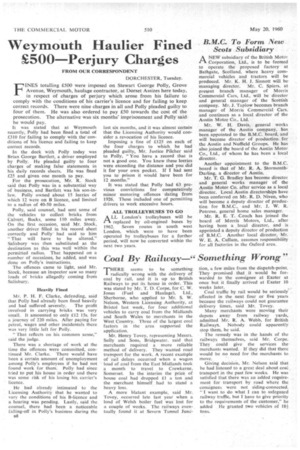Coal By Railway—" Something Wrong"
Page 42

If you've noticed an error in this article please click here to report it so we can fix it.
THERE seems to be something radically wrong with the delivery of coal by rail, and it is up to British Railways to put its house in order. This was stated by Mr. T. D. Corpe, for C. W. Jones (Fuel and Haulage), Ltd., Sherborne, who applied to Mr. S. W. Nelson, Western Licensing Authority, at Bristol last week, for four additional vehicles to carry coal from the Midlands and South Wales to merchants in the West Country. Three of the largest coal factors in the area supported the application.
Mr. Henry Tovey, representing Messrs. Sully and Sons, Bridgwater, said that merchants required a more reliable method of delivery. They .wanted road transport for the work. A recent example of rail delays occurred when a wagon load of coal from the East Midlands took a month to travel to Crewkerne, Somerset. In the interim the price of house coal had dropped £1 a ton and the merchant himself had to stand a heavy loss.
A more blatant example, said Mr. Tovey, occurred late last year when a load of Welsh boiler fuel was lost for a couple of weeks. The railways eventually found it at Severn Tunnel June
lion, a few miles from the dispatch-point. They promised that it would be forwarded to the consignee at Exeter at once but it finally arrived at Exeter 10 weeks later.
Coal traffic by rail would be seriously affected in the next four or five years because the railways could not guarantee delivery times, said Mr. Tovey.
Many merchants were moving their depots away from railway yards, admitted Mr. R. A. Webb, for British Railways. Nobody could apparently stop them, he said.
The remedy was in the hands of the railways themselves, said Mr. Corpe. They could give the services the merchants wanted. If they did that there would be no need for the merchants to move.
Giving decision, Mr. Nelson said that he had listened to a great deal about coal transport in the past few weeks. He was satisfied that there was an added requirement for transport by road where the consignees were not siding-connected. "I want to do what I can to safeguard railway traffic, but I have to give priority to the requirements of the customer," he added He granted two vehicles of 18-} tons.




















































































































